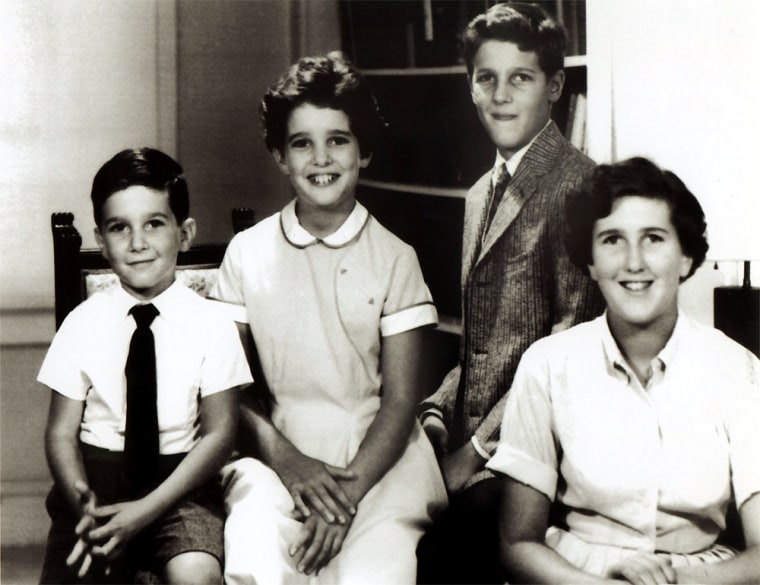Rosemary Forbes Kerry left many things to her son John: a flinty New England resolve, a worldly view of politics, and a middle name that conjures up images of a childhood drenched in wealth.
The Democratic presidential candidate grew up in a world of elite private schools and vacations on a French estate, something most Americans could only dream about. His parents, a U.S. diplomat and a homemaker, turned to a wealthy, childless great-aunt, Clara Winthrop, to help pay the bills.
Before he married Teresa Heinz, the heir to the food empire, Kerry had little more than his annual Senate salary of $133,600 and a trust fund valued at $50,000 to $100,000. When his mother died in 2002, he inherited trusts with $300,000 to $1.5 million in assets — a pittance compared to his wife’s estimated $500 million.
Social prominence and affluence etched Kerry’s early life.
His mother, Rosemary Forbes, was a member of the Forbes shipping family and a descendent of John Winthrop, who helped found Boston in 1630. She was one of 11 children, which thinned the family fortune somewhat. Her father was an international businessman, and she spent her early years in France at the family’s estate.
The finances on the Kerry side of the family were more modest. Kerry’s grandfather, a Czech-Austrian Jew and brewery worker named Fritz Kohn, changed his name to Frederick A. Kerry in 1902 and emigrated to the United States. In 1921, apparently despondent over mounting debts, he shot himself in a restroom at Boston’s Copley Plaza Hotel.
Kerry’s father, Richard Kerry, was a graduate of Yale University and Harvard Law School. Invited to the Forbes estate in France by a friend, Richard Kerry met Rosemary Forbes. They married, and he later took a post in the diplomatic corps, bringing home the salary of a government worker while his wife volunteered for community service.
A Denver native
John Kerry, born in Denver in 1943, lived in Groton and Millis, Mass., before the family moved to Washington when he was 7. He spent part of his youth in Swiss and New England boarding schools thanks to his aunt’s largess.
Kerry has blamed his rootless childhood for his perceived aloofness. But those years also taught Kerry the difference between wealth and status, and how to rely on the latter when money was tight.
“He exuded more worldliness and sophistication than your average Yale undergraduate,” said William “Chip” Stanberry, Kerry’s debating partner at Yale and now head of a health care technology firm in Houston. “But he didn’t come from generations of wealth, and he certainly didn’t act like it.”
Harvey Bundy, Kerry’s roommate at Yale, remembered a young man who was “on the go 110 percent of the time” but spoke little about wealth and privilege.
“He ran in circles with money, but money was never an issue for John. He was cheap,” said Bundy, a Chicago investment manager.
In their freshman year Kerry got a car, even though freshmen weren’t supposed to have cars, but he didn’t want to rent garage space. The solution? Let Bundy’s girlfriend take it back and forth to Wheaton College.
Bundy and Kerry took a no-frills tour of Europe in 1963. “We slept in ultra-cheap hotels,” he said. “It was one of those $5-a-day tours.”
In 1970, a year after returning from the Vietnam War, Kerry married Julia Thorne, who wore a wedding dress handed down from an ancestor whose nuptials were attended by Alexander Hamilton and George Washington. Thorne came from a wealthy Long Island, N.Y., family and, like Kerry, spent long periods of her youth in Europe.
As Kerry struggled to launch his political career, Thorne used her wealth to help support the family. He was a private lawyer and prosecutor in Middlesex County, Mass., before running for lieutenant governor in 1982, the year he and Thorne split. The financial terms of their 1988 divorce were not made public.
After two years in state government, Kerry was elected to the U.S. Senate. Bruce Droste remembers a Kerry too frugal to hire movers during what friends called his “gypsy days.” He bounced from apartment to apartment, sometimes staying with his daughters when his former wife was away or with buddies from his Vietnam years.
“I had a big vehicle at the time and we’d move him,” said Droste, a longtime friend. “He was paying hefty tuitions for his daughters in school. ... This is a man who understands a value of a dollar.”
Second marriage
In 1995, Kerry’s fortunes changed dramatically when he married Teresa Heinz, the widow of Sen. H. John Heinz III of Pennsylvania. His next disclosure report to the Senate included dozens of pages detailing Heinz’s financial portfolio and some of the wedding presents they received, including a mirror with their wedding announcement framed on top from “Mr. and Mrs. Arnold Schwarzenegger” and a Baccarat flower vase from actor Clint Eastwood.
Kerry’s wealth has been a political asset. In 1996, he lent or guaranteed his campaign $1.7 million to fend off a challenge from Massachusetts Republican Gov. William Weld. Late last year, he lent his campaign more than $6 million by mortgaging the six-story brick town house he owns with his wife in the tony Beacon Hill area.
Political foes have mocked Kerry’s blue-blood image. An ad by a conservative advocacy group mimics a popular credit card slogan: “Another rich, liberal elitist from Massachusetts who claims he’s a ’man of the people.’ ... Priceless.”
Kerry’s campaign acknowledges that while he grew up in a family that provided him with an Ivy League education, he chose to dedicate his life to public service.
“Before he even graduated from Yale he made the choice to sign up for war,” campaign strategist Michael Meehan said. “He committed himself to public service when he had a lot of other choices available.”
